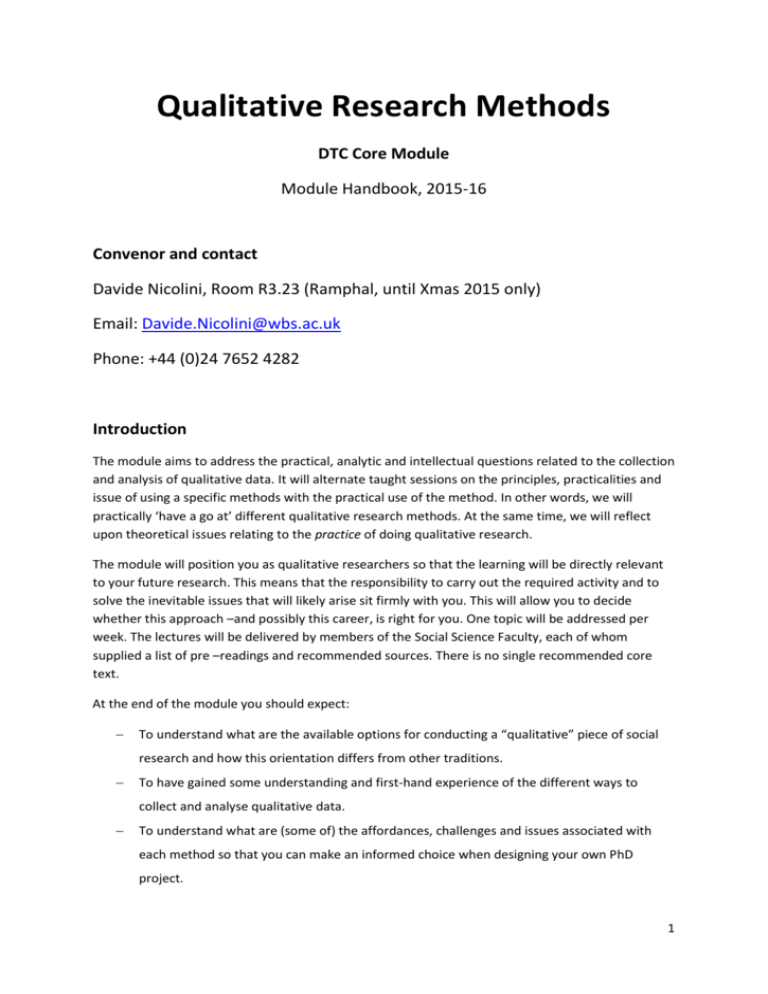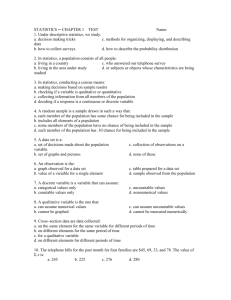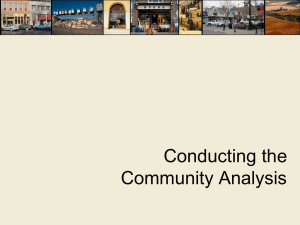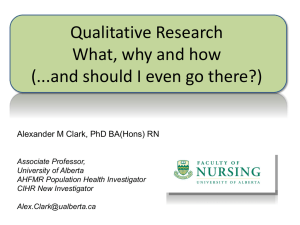The 2015-16 Qualitative Research methods module handbook
advertisement

Qualitative Research Methods DTC Core Module Module Handbook, 2015-16 Convenor and contact Davide Nicolini, Room R3.23 (Ramphal, until Xmas 2015 only) Email: Davide.Nicolini@wbs.ac.uk Phone: +44 (0)24 7652 4282 Introduction The module aims to address the practical, analytic and intellectual questions related to the collection and analysis of qualitative data. It will alternate taught sessions on the principles, practicalities and issue of using a specific methods with the practical use of the method. In other words, we will practically ‘have a go at’ different qualitative research methods. At the same time, we will reflect upon theoretical issues relating to the practice of doing qualitative research. The module will position you as qualitative researchers so that the learning will be directly relevant to your future research. This means that the responsibility to carry out the required activity and to solve the inevitable issues that will likely arise sit firmly with you. This will allow you to decide whether this approach –and possibly this career, is right for you. One topic will be addressed per week. The lectures will be delivered by members of the Social Science Faculty, each of whom supplied a list of pre –readings and recommended sources. There is no single recommended core text. At the end of the module you should expect: To understand what are the available options for conducting a “qualitative” piece of social research and how this orientation differs from other traditions. To have gained some understanding and first-hand experience of the different ways to collect and analyse qualitative data. To understand what are (some of) the affordances, challenges and issues associated with each method so that you can make an informed choice when designing your own PhD project. 1 Assessment The module is assessed via a 3000 word essay assignment. The question will be issued and discussed during the introductory class on 13th January. The submission date for the essay assignment is Friday 15th April 2016. Lecture Schedule Session Date Topic Faculty 1 2 3 4 5 6 13 January 20 January 27 January 3 February 10 February 17 February Davide Nicolini Ola Henfridsson Chris Warhurst Gaby Atfield & Sally-Anne Barnes Gaby Atfield & Sally-Anne Barnes Davide Nicolini 7 24 February (whole day workshop) 2 March (date subject to possible to change to 3 March) Introduction Case study design Doing Research Interviews Analysing interview data Analysing interview data Participant observation and Ethnography Principles and practicalities of doing thematic analysis and Grounded Theory Video based methods in social research Discourse analysis Johannes Angermuller Documentary analysis David Arnott 8 9 10 10 March (an exceptional Thursday session 2:30-6pm in Westwood Lecture Theatre) 16 March Natalia Levina (Not on Warwick email) Jeanne Mengis 2 Lectures outline and pre-readings 1. Introduction to Qualitative Research – Davide Nicolini This session poses the simple question, what is ‘qualitative’ about qualitative research? It is a session about practical and intellectual boundaries: what links ‘qualitative researchers’ whilst distancing them from other scholars? This will be addressed positively and critically. Positively, we shall consider similar things qualitative researchers practically do and similar ways they think and talk about their work. We will also think critically about the question and explore the differences among qualitative scholars. Will conclude by problematizing the established but in many ways increasingly problematic label of “qualitative research” noting that this category increasingly brings together very unlikely bedfellows. Pre-readings Halfpenny, P. (1979). Analysing Qualitative Data. The Sociological Review, 27(4): 799-827. Silverman ,D. (2007). A Very Short, Fairly Interesting and Reasonably Cheap Book about Qualitative Research. London: Sage. (At least chapter 1 ‘Innumerable Inscrutable habit: Why Unremarkable Things Matter’). Jovanovic, G. (2011). Towards a Social History of Qualitative Research. History of the Human Sciences, 24(2): 1-27. 2. Case study design- Ola Henfridsson The session will cover three main aspects of case study design: case definition, case(s) selection principles, and study process. The purpose is to offer an overview of relevant considerations when developing a case study design. First, the session will present different ways of thinking and defining the case as an instance of the phenomenon studied. Second, it will give an overview of different case selection techniques and consider the implications of such selection. Lastly, it will cover different ways of organising the case study process. Pre-readings Gerring, J. 2007. Case Study Research: Principles and Practices. Cambridge: Cambridge University Press. (chapters 2-5, especially 5) Ragin, C.C. 1992. "Introduction: Cases of "What Is a Case?"," in: What Is a Case? Exploring the Foundations of Social Inquiry, C.C. Ragin and H.S. Becker (eds.). Cambridge: Cambridge University Press, pp. 1-17. 3 3. Doing Research Interviews – Chris Warhurst This session is designed to introduce participants to the nature of the qualitative research interview and to provide the practical knowledge and skills that will allow them to use this as a method for gathering data. The lecture will introduce the research interview and discuss different forms of interview. As well as identifying a number of ‘dilemmas’ which can provide the basis for a critical and reflective approach to qualitative interviewing, it will consider ‘parameters of sensitivity’ designed to help participants develop a reflective approach to carrying out, analysing and reporting on qualitative interviews. The workshop will focus on the practicalities of research interviewing (developing an interview guide, setting up, question types and strategies, degrees of directiveness, etc.) and interview evaluation. It will provide the tools not only for conducting interviews but also for improving and refining interview technique. Pre-readings Bryman, A. and Bell, E. (2003) Business Research Methods, Oxford: OUP, chs. 5 & 15. Gillham, B. (2000) The Research Interview, London: Continuum. Roulston, K. (2010). Considering quality in qualitative interviewing. Qualitative Research, 10(2): 1-30. Warhurst, C. (1999) Between Market, State and Kibbutz, London: Mansell, Appendix. 4. Analysing Interview Data – Gaby Atfield & Sally-Anne Barnes This session will introduce participants to the interview data analysis and the process of handling, interpreting and understanding data collected through a variety of interview methods. The lecture will introduce different processes, techniques and theories for analysing interview data and summarising the results – both inductive and deductive processes. It will focus on coding, identification of themes, interpretation, testing theory and theory building. The second part of the session will be a practical workshop getting participants to start thinking about the analysis process. To support the practical session, it would be helpful if students could read and bring a copy of the following: Glaser, B.G. and Strauss, A.L. (1964). The Social Loss of Dying Patients, The American Journal of Nursing, 64(6), pp. 119-121. Pre-readings Charmaz, C. (2001). Qualitative interviewing and grounded theory, in Gubrium, J.F. and Holstein, J.A. (eds) Handbook of interview research: Context and method. Thousand Oaks, California: Sage Publications (pp.675-694). Packer, M.J. (2011). The science of qualitative research. New York: Cambridge University Press. 4 5. Analysing Interview Data (part 2) – Sally-Anne Barnes & Gaby Atfield This session will focus on different approaches to analysing interview data in practice, namely deductive analysis and grounded theory. Validating qualitative analysis and problems with analysing process will be explored. The debates around manual and computer-aided coding will also be explored, as well as the role of the researcher in the analysis process. The second part of the session will again be a practical session getting participants to work with interview data exploring different techniques for analysing and coding data. Participants will be asked to reflect upon the process in terms of their own research and what methods of analysis would be appropriate. Participants who have interview data and would like to start analysing are welcome to bring to the session. For those who have not undertaken any interviews, transcripts to be used in the session will be available in week 3. Pre-readings Coffey, A., Holbrook, B. and Atkinson, P. (1996). Qualitative Data Analysis: Technologies and Representations, Sociological Research Online, 1(1): http://www.socresonline.org.uk/1/1/4.html Denzin, N.K., and Lincoln, Y.S. (2012). (eds) Collecting and interpreting qualitative materials, (4th Ed). Thousand Oaks, California: Sage Publications. 6. Participant observation and Ethnography - Davide Nicolini This session explores ethnography; a research approach that focuses on researching everyday processes. Documenting and analysing the mundane elements of social process and human interaction is at the centre of ethnographic inquiry. Ethnography has a long history tied to Anthropology but has been applied extensively in a range of social organisations (school, churches, hospitals and bars) as well as public sector bodies and corporations. We will explore the planning, approaches to data collection, the role of the researcher and application of modern technologies in ethnographic investigation. Pre-readings Star, S, L. (1999). The ethnography of infrastructure. American Behavioral Scientist 43: 377–391. John Van Maanen, J. and Deborah Kolb, D. (1983) The Professional: Observations on fieldwork roles in two organizational settings. In S.B. Bacharach (ed) Perspectives in Organizational Sociology, Vol. 4. Greenwich, CT: JAI Press; 1-33. Hammersley, M. and Atkinson, P. (1995). Ethnography: Principles in Practices, (2nd Edition) London: Routledge. Chapters 1, 8 and 9. 5 7. Principles and practicalities of doing thematic analysis and Grounded Theory – Natalia Levina Format: One full day workshop 3 hours of general discussion of GTM Paradigm 3 hour hand-on coding workshop This one-day workshop explores classic grounded theory as a research approach enabling emergent theory development from data. The workshop will explain what grounded theory is, and how it has and can be done. We will go through the steps of Grounded Theory Method (GTM) making sure key concepts of theoretical sampling, theoretical saturation, and constant comparison are clarified. In addition tools like “memoing” would be discussed. We will also clarify and debate the strengths and weakness of this method as well as novel developments with the use of mixed-methods. Finally, we will discuss publishing “grounded theory” studies. The afternoon session is the space for the students to do their own thematic coding of data they have collected previously. Behind identifying themes we will discuss how further data collection would be shaped by emergent findings and the role of extant literature in data analysis and writing. This will be a hands-on workshop where participants will play with their data under the supervision of the faculty involved. Required Pre-Readings: Walsh, et al., 2015 “What grounded theory is… A critically reflective conversation among scholars,” Organizational Research Methods, (published online January 2015) Commentary by Locke, Corley, and Dougherty in Organizational Research Methods (published online in March 2015: ) Rejoinder by Walsh et al. “Rejoinder: Moving the Management Field Forward,” in Organizational Research Methods (published online in June 2015). Birks et al., 2013 “Grounded theory method in information systems research: its nature, diversity and opportunities” Editorial for European Journal of IS, 22(1):1-8. (skim) Eisenhardt, K.M. 1989. Building Theories from Case Study Research. AMR 14(4):532-550. Holton J., “The Coding Process and Its Challenges” in The Grounded Theory Review (2010), vol.9, no.1 8. Visual Methods in social research - Jeanne Mengis Nowhere is the inseparability of theory, technology and method more apparent than in the recent rise of visual methodologies in the social sciences. The latest theoretical developments of our fields are co-implicated with the technological developments and media practices that shape our empirical studies. Today, a variety of visual methods are 6 used for data collection and analysis, ranging from photography- and video-based studies to visual mapping techniques, sketching, or direct visualization techniques (e.g. geomediabased visualizations of social relations). In this half-day seminar, the student will practically engage with two, more widely used visual methods, namely photography- and video-based research. We will address and experience practical challenges the researcher faces, such as how to use visual material in the interaction with research participants, when and how to video-record (e.g. how to combine with other methods, when to turn camera on/off, who makes the recording, what camera position, angle and camera movement to deploy), and how to analyze the (moving) image. We will then critically reflect upon the implications these merely technical choices have for the manifestation, understanding and theorizing of our object of inquiry. Selected References Banks, M. (2001). Visual methods in social research. Sage. Knoblauch, H., Baer, A., Laurier, E., Petschke, S., & Schnettler, B. (2008). Visual analysis. New developments in the interpretative analysis of video and photography. In Forum Qualitative Sozialforschung/Forum: Qualitative Social Research, (Vol. 9, No. 3). Mengis, J., Gorli, M., & Nicolini, D. The Video Production of Space: How Different Recording Practices Matter (under review) Pink, S. (2007). Doing Visual Ethnography. Sage. Pink, S. (2009). Visual Interventions: Applied Visual Anthropology (Vol. 4). Berghahn Books. Pink, S. (Ed.). (2012). Advances in visual Methodology. Sage. Rose, G. (2001). Visual Methodologies. An Introduction to the Interpretation of Visual Materials. Sage. Van Leeuwen, T., & Jewitt, C. (Eds.). (2001). The Handbook of Visual Analysis. Sage. Yanow, Dvora (2014) Methodological ways of seeing and knowing. In: Bell, E., Warren, S. and Schroeder, J. (eds.), The Routledge Companion to Visual Organization, Chapter 11, pp. 165-187, Routledge 9. Discourse Analysis - Johannes Angermuller Discourse analysis is a transdisciplinary field which investigates the social production of meaning. In this session, we will discuss theoretical orientations and methodological choices available to the discourse researcher. Our focus will be on the social uses that can be made of language, i.e. on the way signs, utterances and texts contribute to the construction of the social. 7 Pre-readings Angermuller, Johannes/Maingueneau, Dominique/Wodak, Ruth (eds) (2014): The Discourse Studies Reader. Main Currents in Theory and Analysis. Amsterdam, Philadelphia: John Benjamins http://johannes-angermuller.net/pub/html/AngermullerMaingueneauWodak2014Reader.html Angermüller, Johannes (2012): Fixing meaning. The many voices of the post-liberal hegemony in Russia. Journal of Language and Politics, 11 (2), 115-134 http://johannes-angermuller.net/pub/html/Angermueller2010FixingMeaning.html 2013a: "How to become a philosopher. Academic discourse as a multi-levelled positioning practice", Sociología histórica 3: 263-289 http://johannes-angermuller.net/pub/html/Angermuller2013Howtobecomeaphilosopher.html 10. Documentary Analysis – David Arnott Documentary analysis is a collective term for methods of sampling and analysing populations of documentary evidence. However, documents take many forms – public records, the media, private papers, company reports and accounts, case studies, biographies, diaries, narratives, recollections, social histories, to mention just a few, and they may be episodic or continuous in nature. The range of approaches to analysis is equally diverse. This session will focus on two interrelated techniques: Content Analysis and Grounded Theory Content Analysis spans the qualitative/quantitative boundary and is invaluable when analysing existing documents. It has been used since the late 1930’s to codify and research communication issues as diverse as political speeches, literary censorship, authorship authentication, and early memories of psychological patients. Grounded Theory relates to the extraction and testing of theoretical constructs and concepts from qualitative data and documents but, most often, from data and documents created by the researcher. Pre-readings Kassarjian, H.H. (1977). Content analysis in consumer research. Journal of Consumer Research. 4(1). 8-18. Schilling, J. (2006). On the pragmatics of qualitative assessment: Designing the process for content analysis. European Journal of Psychological Assessment. 22(1). 28-37. Binder, M. & Edwards, J.S. (2010). Using grounded theory method for theory building in operations management research: A study on inter-firm relationship governance. International Journal of Operations and Production Management. 30(3). 232-259. 8







